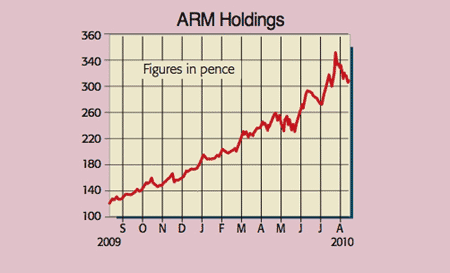Get the latest financial news, insights and expert analysis from our award-winning MoneyWeek team, to help you understand what really matters when it comes to your finances.
You are now subscribed
Your newsletter sign-up was successful
Want to add more newsletters?

Twice daily
MoneyWeek
Get the latest financial news, insights and expert analysis from our award-winning MoneyWeek team, to help you understand what really matters when it comes to your finances.

Four times a week
Look After My Bills
Sign up to our free money-saving newsletter, filled with the latest news and expert advice to help you find the best tips and deals for managing your bills. Start saving today!
Last Thursday I ran a stock screen on the FTSE 100 based on future earnings per share (EPS) estimates. I was rather surprised to discover that the most expensive equity in terms of the 2011 earnings was ARM, the Cambridge-based chip-designer. It is undoubtedly a great company. But is it really a great stock, having soared 275% from its 2009 lows of 79p to currently hovering near an eight-year high? I'm not sure.
ARM invents proprietary designs for microchips that are licensed (31% of sales) to manufacturers. Having created the intellectual property, ARM has the chips manufactured elsewhere. It then sells on the science to manufacturers who also pay royalties (54%) each time a device using its technology is sold.
Its first-rate blueprints are incorporated within 26% of all electronic devices, such as cameras, TVs, and 95% of all mobile phones (generating 63% of 2009 sales). Its customers include a raft of tech companies, such as Microsoft, and most of the major chip producers notably Samsung, Sony Ericsson, Toshiba and Texas Instruments.
MoneyWeek
Subscribe to MoneyWeek today and get your first six magazine issues absolutely FREE

Sign up to Money Morning
Don't miss the latest investment and personal finances news, market analysis, plus money-saving tips with our free twice-daily newsletter
Don't miss the latest investment and personal finances news, market analysis, plus money-saving tips with our free twice-daily newsletter
ARM has 690 licences with clients in 2009 these generated royalties on 3.9 billion chips at an average cost of 5.3 cents each. One of the reasons for the surging share price is that 2010 looks like being a blockbuster year for the industry, with shipments expected to be 10%-15% ahead. ARM is also outperforming its rivals, entering 2010 with a lower cost base and growing its market share. That is expected to translate into earnings growth of around 50% this year.
ARM Holdings (LSE: ARM), rated OUTPERFORM by BMO Capital

Sadly, the skies above ARM are not all blue. In the interims, CEO Warren East admitted that he saw "uncertainty in consumers' demand for gadgetry" a message confirmed by Cisco last week. In the second quarter (Q2) of 2010, royalties per chip dropped to 4.5 cents, from 4.8 cents in the first quarter and 5.7 cents in Q2 2009. That reflects hefty price deflation and the firm's shift into lower-cost microcontrollers, Bluetooth chips, and smartcards.
What's more, I suspect the key factor supporting today's rating is a belief that ARM will get taken over by Apple. It's possible, but any transaction would be incredibly expensive and would probably be blocked by the competition regulators. Perhaps there are other suitors Chinese or Indian buyers with deep pockets. But that could also trigger national security issues.
So how much is ARM worth? The City forecasts 2010 revenues and underlying EPS of £390m and 8.49p respectively, rising to £435m and 9.92p in 2011. The shares trade on very stretched p/e ratios of 36.9 and 31.6, while also offering a skinny 0.8% dividend yield. This valuation simply looks crazy to me, particularly as it also equates to an enterprise value/sales multiple of almost ten. I would value the group on a 15-times EBITA multiple. Adding back the £202m of net cash produces an intrinsic worth of about 190p per share.
In summary, the bulls are relying on the continued iPhone hype, the e-book hype, and the mobile-computing hype. But hype is simply hot air. So follow the directors' lead and make for the exit.
Recommendation: SELL at 314p
Paul Hill also writes a weekly share-tipping newsletter, Precision Guided Investments
Get the latest financial news, insights and expert analysis from our award-winning MoneyWeek team, to help you understand what really matters when it comes to your finances.
Paul gained a degree in electrical engineering and went on to qualify as a chartered management accountant. He has extensive corporate finance and investment experience and is a member of the Securities Institute.
Over the past 16 years Paul has held top-level financial management and M&A roles for blue-chip companies such as O2, GKN and Unilever. He is now director of his own capital investment and consultancy firm, PMH Capital Limited.
Paul is an expert at analysing companies in new, fast-growing markets, and is an extremely shrewd stock-picker.
-
 Can mining stocks deliver golden gains?
Can mining stocks deliver golden gains?With gold and silver prices having outperformed the stock markets last year, mining stocks can be an effective, if volatile, means of gaining exposure
-
 8 ways the ‘sandwich generation’ can protect wealth
8 ways the ‘sandwich generation’ can protect wealthPeople squeezed between caring for ageing parents and adult children or younger grandchildren – known as the ‘sandwich generation’ – are at risk of neglecting their own financial planning. Here’s how to protect yourself and your loved ones’ wealth.